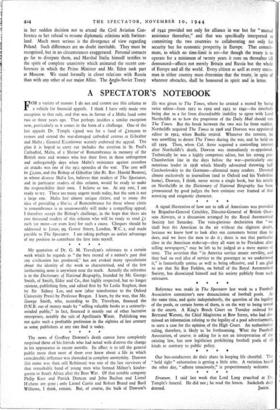of 1942 provided not only for alliance in war but
for " mutual assistance thereafter," and that was specifically interpreted as committing the two countries to collaborating not only for security but for economic prosperity in Europe. That commit- ment, to which no time-limit is set—for though the treaty is to operate for a minimum of twenty years it runs on thereafter till denounced—affects not merely Britain and Russia but the whole of Europe and all the world. Every citizen as well as every states- man in either country must determine that the treaty, in spite of whatever obstacles, shall be honoured in spirit and in letter.
'S NOTEBOOK
life was given to The Times, where he created a record by being twice editor—from 1912 to 1919 and 1923 1941—the interlude being due to a far from discreditable inability to agree with Lord Northcliffe as to how the proprietor of the Daily Mail should run The Times. But the break between the two was far from sudden. Northcliffe acquired The Times in 19o8 and Dawson was appointed editor in 1912, when Buckle retired. Whatever the tension, he was unwilling to desert The Times during the war, and he held on till 1919. Then, when Col. Astor acquired a controlling interest after Northcliffe's death, Dawson was immediately re-appointed. Technically he was a highly competent editor, but his strong pro- Chamberlain line in the days before the war—particularly one notorious leader in 1938 which blandly advocated throwing half Czechoslovakia to the Germans—alienated many readers. Devoted almost exclusively to journalism (and to Oxford and his Yorkshire home), Dawson, I think, never wrote a single book, but his article on Northcliffe in the Dictionary of National Biography has been pronounced by good judges the best estimate ever framed of that
arresting and enigmatic character.
* * *


























 Previous page
Previous page